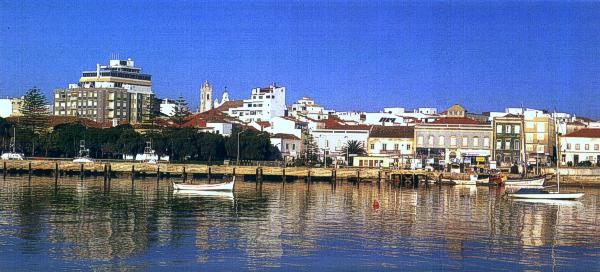|
Portimão |
| Portugal > Tourism > Algarve > Portimão > History |
|
The Municipality
| Gastronomy | Praia
da Rocha | The City | Golf
| Lodging
|
| Proof of a human presence in the locality since the Neolithic period
is furnished by the extensive burial grounds at Alcalar and Monte Canelas
and by other archaeological finds scattered across the municipality.
The recent discovery at Vila Velha de Alvor of what are probably the
remains of a village dating from the 2nd or 3rd century B.C. and the
archaeological and maritime artifacts recovered from the Arade river
and the coastal areas of the municipality throw new light on the importance
of the region during the period when Atlantic trade routes with the
Mediterranean and North Africa were developing, following the emergence
of Phoenician, Greek and Carthaginian factories. Although theories that variously identify Portimão with Portus Hannibalis, Portus Magnus and Porcimunt remain controversial, there can be no doubt about the Roman presence in the city and the surrounding municipality. Amphorae, coins, fish-salting tanks, bronze objects, cisterns, sundry building materials, the remains of buildings at Vale de Arrancada, Montemar, Baralha and above all the major "villa" site at Abicada bear eloquent witness to this fact. In material terms, the Moorish heritage is restricted to occasional finds of pottery and coins. But the Moorish influence endures in the distinctive shape of chimneys and water wheels, in small chapels and buildings made of the mixture of clay, rubble, sand and lime known as "taiga", in the region's agriculture and in some of the types of vegetation to be found. Modern Portimão came into being in the reign of king Afonso V (1463) with the granting of certain privileges to a settlement which would come to be called Vila Nova de Portimão and around which a ring of defensive walls would later be built. Portimão was ideally placed to enjoy the fruits of the boom in international trade stimulated by the great Portuguese voyages of discovery and prospered as a haven for ships plying the African coast. The earthquake of 1755 destroyed much of the town and prompted an economic decline that was reversed only towards the end of the 19th century by the return of trade, exports of dried fruit, milling, fishing and the fish-canning industry, activities which would continue into the 20th century. Portimão was made a city in 1924 by the then President of the Republic, the writer Manuel Teixeira Gomes, himself a native son of Portimão. In the last three decades tourism has been the motor driving Portimão's economy and the city can now claim to be the second most populous in the Algarve. |

|
The Municipality
| Gastronomy | Praia
da Rocha | The City | Golf
| Lodging
|
| Portugal > Tourism > Algarve > Portimão > History |
|
History |